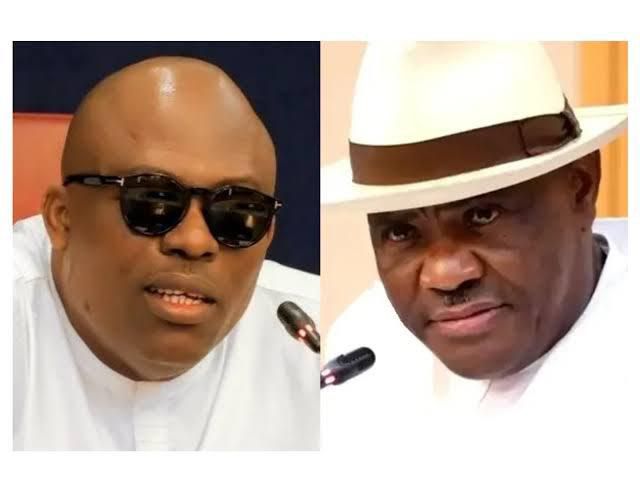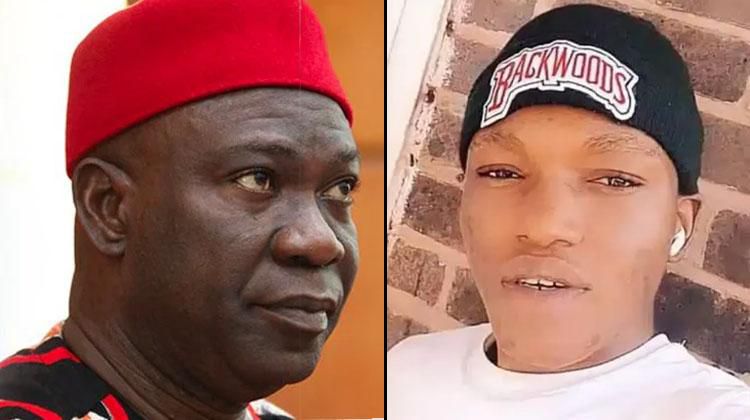7 biggest moments in Nigerian politics in 2023
)
The Nigerian political scene rarely fails to deliver the goods. From petty contestations to issues of national importance, the drama and twists are endless, and 2023 packed quite a few.
Nigerians were given an enthralling ride throughout the year, with the general elections in February and March setting the tone for a rollercoaster journey. Along the lines were developments that have continued to impact the lives of the citizens significantly.
As we race towards the end of the year, let's revisit those big moments that shaped Nigerian politics in 2023. Here we go!
![INEC chairman, Prof Mahmood Yakubu, presents certificate of return to president-elect, Bola Tinubu [Twitter/@BashirAhmaad]](https://image.api.sportal365.com/process/smp-images-production/pulse.ng/26072024/8eb32e06-7ada-4b79-8342-2b08128ee3f2)
1. Tinubu's declaration as the winner of the presidential election
Unarguably the pick of the bunch, Bola Tinubu's declaration by the Independent National Electoral Commission (INEC) as the winner of the hotly-contested presidential election marked a remarkable moment in Nigerian politics.
The allegations of compromise and other misdeeds levelled against the electoral umpire aside, the victory of the All Progressives Congress (APC) candidate took many people by surprise.
The former Lagos State Governor went into the contest with some moral burdens, including an identity crisis, certificate forgery allegations, choosing a Muslim running mate as well as questions about his health.
Tinubu also didn't cover himself in glory during his campaign outings, where he made gaffes that made him the butt of social media memes and jokes.
The naira and fuel scarcity also placed a big hurdle in his path, but Tinubu rose above these challenges and achieved his lifelong dream of becoming Nigeria's president.

2. The fight between Wike and Fubara
While animosity between a political godfather and his protégé isn't alien to Nigerian politics, the ongoing feud between the Rivers State Governor, Siminalayi Fubara and his predecessor, Nyesom Wike, came with some elements of surprise.
Barely five months after the change of baton, Wike and Fubara have become strange bedfellows. The former installed the latter as his successor and deployed his political might to ensure his emergence.
However, a breakdown in pre-election agreements seemed to have driven a wedge between the duo. Words on the streets are that the Federal Capital Territory (FCT) Minister wanted to remotely control the affairs of Rivers State from Abuja while the governor is battling to break free from his estranged boss' shackles.
This development has sparked a messy political crisis in the oil-rich state, causing the demolition of the state House of Assembly, party defections and a mass exodus of commissioners from Fubara's government.
As the incumbent governor continues to wean himself off the Wike burden, the former governor has insisted his successor was hell-bent on destroying the political structure that brought him to power.
![President-elect, Asiwaju Bola Tinubu and Kaduna State governor, Nasiru El-Rufai. [Twitter:@BashirElRufai]](https://image.api.sportal365.com/process/smp-images-production/pulse.ng/26072024/541bd015-8cdb-4151-b6df-2e14e8642bd7)
3. El-Rufai's rejection as minister
In Nigerian politics, some developments are inconceivable, like a Senate dominated by the ruling party refusing to confirm a ministerial nominee by the president, which is why the failure of the immediate past Governor of Kaduna State, Nasir El-Rufai, to pass the ministerial screening raised a lot of unanswered questions.
Fresh off his eight-year stint as the helmsman in Kaduna, El-Rufai was offered the chance to return to the federal cabinet by Tinubu. Though the former FCT Minister had said he needed a break from governance, he accepted the nomination and presented himself for screening before the Senate.
However, against all expectations, the red chamber, led by Godswill Akpabio, couldn't give the former governor a clean bill of health, citing a security report from the Department of State Service (DSS).
El-Rufai was a very vocal supporter of Tinubu and went to war with former President Muhammadu Buhari to ensure the victory of the APC candidate, but there were insinuations that President Tinubu didn't push hard enough to convince the Senate on his matter.
![President Bola Tinubu at his inauguration ceremony [NPF]](https://image.api.sportal365.com/process/smp-images-production/pulse.ng/26072024/0b3d5d00-b193-4920-98ab-78a707fb5d28)
4. Removal of the fuel subsidy
Just a few minutes after taking his oath of office, President Tinubu while delivering his inaugural speech dropped a major bombshell on Nigerians with his controversial "subsidy is gone" pronouncement.
Identified as the behemoth impeding Nigeria's development and economic prosperity, fuel subsidy was a controversial campaign point, and all the frontline candidates agreed that the policy had outlived its usefulness, but how Tinubu went about the removal remains the subject of an unending debate.
With the announcement came an astronomical increase in fuel price as the commodity jumped from ₦185 per litre to around ₦650. This development caused a ripple effect in the economy as the ballooning inflation rate sped up, inflicting further hardship on Nigerians.
Though the Federal Government has since introduced some palliative measures to cushion the effect of the subsidy removal, the afterthought initiatives have barely offered any respite for the suffering masses who are gnashing their teeth amid the unbearable living conditions.
![Labour Party presidential candidate, Peter Obi. [Twitter:@PeterObi]](https://image.api.sportal365.com/process/smp-images-production/pulse.ng/26072024/07e8219d-3ebc-497b-935e-af7e517ea66c)
5. Peter Obi and Labour Party's surprise outing
Written off as mere distractions, Peter Obi and the Labour Party were just whiskers away from pulling the impossible in this year's general elections — or perhaps they did.
The former Anambra State Governor joined the presidential race as a third-force candidate, and his candidacy gave the almost forgotten Labour Party a new breath of life that shunted them to national prominence.
Propelled by the support of his enthusiastic followers, Obi gave a good account of himself, polling over six million votes and winning 12 states, including the FCT. This feat was beyond impressive for a first-time candidate, and he has even argued that he won the election but for INEC's alleged compromise.
Finishing third behind seasoned politicians like Tinubu and Peoples Democratic Party (PDP) candidate Atiku Abubakar was a big success, but that doesn't fully reflect Obi's impact on the elections.
Besides winning seats in the Senate and House of Representatives, the party also won the governorship election in Abia State, and these successes were mainly due to Obi’s audacity to challenge the status quo.
![President Bola Ahmed Tinubu and ECOWAS Heads of Government. [Premium Times]](https://image.api.sportal365.com/process/smp-images-production/pulse.ng/26072024/ada48876-e376-4f8b-93da-e053a6dadcac)
6. The Niger Republic crisis
The military takeover of power in the Niger Republic in July had a considerable bearing on the Nigerian political landscape. Niger isn't only a neighbouring country but one with a lot of cultural affinity and trade exchange with Northern Nigeria.
To pressure the coupists into restoring ousted President Mohamed Bazoum to power, the Economic Community of West African States (ECOWAS), under the chairmanship of Tinubu, imposed various sanctions on the West African country while threatening military action.
The ECOWAS declaration triggered reactions from many Nigerians who vehemently criticised Tinubu for allegedly wanting to start a war between Nigeria and Niger Republic.

7. Ekweremadu’s sentencing in the UK
Former Deputy President of the Senate, Ike Ekweremadu, met his waterloo in the United Kingdom, where he was indicted and sentenced to nine years and eight months in prison for conspiring to harvest the kidney of a young man.
The lawmaker, alongside his wife, Beatrice, and a medical doctor, Obinna Obeta, were found guilty of arranging the travel of the unnamed man to the UK to exploit him for his organ.
The trio made history by becoming the first Africans convicted under the UK’s Modern Slavery Act. Ekweremadu had conspired with others to lure the victim to the UK to harvest his kidney for his 25-year-old daughter, Sonia, who has a severe kidney disease.
)
)
)
)
)
![2026 Golden Globes: Teyana Taylor, Timothee Chalamet and the biggest winners [FULL LIST]](https://sportal365images.com/process/smp-images-production/pulse.ng/12012026/002666db-358d-4deb-9510-84cdb274ffda.png?operations=autocrop(112:112))
)
)